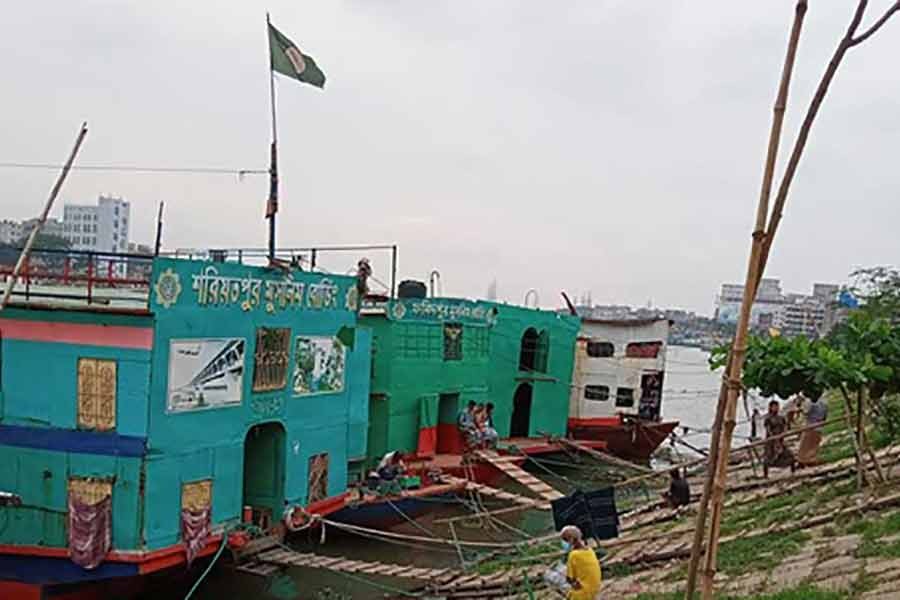At first blush, a run-down double-decked boat crammed with stuffy cabins, anchored on the waste-ridden and stench-filled banks of the Buriganga River hardly corresponds with the idyllic scenes and settings that may typically be associated with a floating hotel.
But the unusual living spaces have long been a lifeline for those without much to spare. A night at one of the floating hotels may cost as little as Tk 40, reports bdnews24.com.
With his foot bandaged, Chandpur-native Shahadat Hossain has come to see a doctor in Dhaka. He came to the Faridpur Muslim Hotel immediately after he arrived by launch.
“I am renting a cabin for Tk 100," he said. "Where else could I get lodgings cheaper than this? The doctor has told me the length of time needed for my recovery, so I came here for an inexpensive place to stay.”
But it is not just travellers who benefit from the cheap accommodation during a visit to the capital -- some have even made their stays permanent.
The 68-year-old Zulhas Miah has been a tenant at Faridpur Muslim Hotel for 35 years, over half his life. He hails from a village in Shariatpur.
“I came to Dhaka during the war to look for work,” he said. “I couldn’t find anything, so I began selling paan and bidi at the Sadarghat Terminal. Now I work as a fruit trader on the sidewalk. In the 80s, you could spend the night at one of the hotels on the Waisghat if you ate there. They introduced the fees later on.”
“I’ve spent many years here – nearly 30-40 years. I began staying here regularly around a year or two after the Ershad regime came to power. Now I pay Tk 40 to stay here. But I can’t quite let the place go.”
Despite being a mainstay on the Buriganga for over half a century, the headwinds of the coronavirus pandemic have left these hotels struggling to stay afloat as the customers have dried up since last year.
An enforced relocation to Waisghat has only rubbed salt in the wound.
Initially positioned on the eastern end of Sadarghat, the convenient location of the floating boats meant that passengers getting off launches could board the hotels immediately.
But construction work has been underway on the Waisghat for the past eight or nine months, forcing the hotels to move to the pier next to the Mitford Hospital to the west of Babubazar Bridge.
No passenger launches stop at that pier, making it difficult for the hotels to attract lodgers.
The first of the floating hotels was the ‘Hindu Hotel’, which launched in 1968.
Food and board were only Tk 4 at the time. In 1975, a change in ownership led to a change in the name. It is now called the Faridpur Muslim Hotel.
Initially, the hotel had also offered dining services but eventually stopped in 2002.
Five other floating hotels can be found in the area. Three of them are named Buriganga Boarding, Shariatupur Boarding and Ujala Boarding, while the other two have no names. All of them opened after 1976.
Each of the hotels has 25 to 30 cabins. Each cabin has electricity, lights, fans and overnight beds, though the standards aren’t very high.
Owners and workers at these hotels say the pandemic has dealt a massive blow to the business.
The combination of the pandemic and the relocation has been devastating, says Faridpur Muslim Hotel owner Golam Mostafa Miah.
“We don’t get many customers aside from our regulars… we now have about a third of the boarders we used to. The situation is grim. Sometimes we have trouble earning enough to pay the electricity bill. It’s hard for my employees to get by and it’s hard for me too.”
Pinto Chandra Saha, the manager of Uma Ujala Boarding, echoes the sentiment. Pinto says the floating hotel was originally owned by Hazi Nawab Miah. Pinto has worked there for 17-18 years, becoming manager of the hotel after Miah’s death eight years ago.
Pinto carefully calculates his earnings and sends a large chunk of it to his family every week, but it has been difficult due to the diminished income.
“I run the hotel alongside another employee. It’s hard to manage the current situation. It’s hard to pay the many bills, let alone send money to the owner’s family.”
“We don’t even get a third of the boarders we used to. Only seven of our 42 seats are occupied.”
The outlook is equally grim for the owners and employees of the other hotels.
A HAVEN FOR THOSE WITH LIMITED MEANS
Golam Mostafa Miah has worked at Faridpur Muslim Hotel for 36 years. It was originally owned by his uncle Abdus Sattar. Though Golam Mostafa started as an employee, he has been the floating hotel’s owner for seven years now.
The hotel has 46 rooms, Golam Mostafa says. Boarders can rent rooms on a daily or a monthly basis. Most of their customers are people who come to Dhaka on business. Some may need to spend several months in the area.
“You can check in at these hotels until midnight and check out by 11 am in the morning,” Golam Mustafa said. “A local room is Tk 40, a single cabin is Tk 80 and a double cabin is Tk 100.”
Aslam, who hails from Barishal, is lodging at a Tk 100 cabin at Shariatpur Muslim Boarding.
He says he comes to Dhaka regularly as part of his work and this is where he spends the night.
Nayan Sikder hails from Bhola and drives a van rickshaw. He has regularly spent the night at Uma Ujala Boarding for about seven or eight years.
“I pay Tk 40 to stay here. Five years ago, I would pay Tk 35 to stay here and eat somewhere else. I don’t earn much, so this is where I live. I like it here.”


